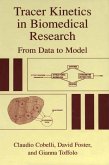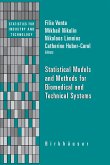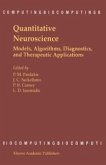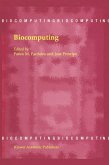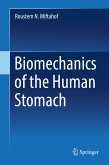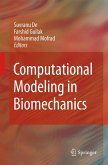

Alle Infos zum eBook verschenken

- Format: PDF
- Merkliste
- Auf die Merkliste
- Bewerten Bewerten
- Teilen
- Produkt teilen
- Produkterinnerung
- Produkterinnerung

Hier können Sie sich einloggen

Bitte loggen Sie sich zunächst in Ihr Kundenkonto ein oder registrieren Sie sich bei bücher.de, um das eBook-Abo tolino select nutzen zu können.
This innovative textbook brings together modern concepts in mathematical epidemiology, computational modeling, physics-based simulation, data science, and machine learning to understand one of the most significant problems of our current time, the outbreak dynamics and outbreak control of COVID-19. It teaches the relevant tools to model and simulate nonlinear dynamic systems in view of a global pandemic that is acutely relevant to human health.
If you are a student, educator, basic scientist, or medical researcher in the natural or social sciences, or someone passionate about big data and…mehr
- Geräte: PC
- ohne Kopierschutz
- eBook Hilfe
- Größe: 24.56MB
![Tracer Kinetics in Biomedical Research (eBook, PDF) Tracer Kinetics in Biomedical Research (eBook, PDF)]() Claudio CobelliTracer Kinetics in Biomedical Research (eBook, PDF)169,95 €
Claudio CobelliTracer Kinetics in Biomedical Research (eBook, PDF)169,95 €![Modeling of Biological Materials (eBook, PDF) Modeling of Biological Materials (eBook, PDF)]() Modeling of Biological Materials (eBook, PDF)149,79 €
Modeling of Biological Materials (eBook, PDF)149,79 €![Statistical Models and Methods for Biomedical and Technical Systems (eBook, PDF) Statistical Models and Methods for Biomedical and Technical Systems (eBook, PDF)]() Statistical Models and Methods for Biomedical and Technical Systems (eBook, PDF)149,79 €
Statistical Models and Methods for Biomedical and Technical Systems (eBook, PDF)149,79 €![Quantitative Neuroscience (eBook, PDF) Quantitative Neuroscience (eBook, PDF)]() Quantitative Neuroscience (eBook, PDF)113,95 €
Quantitative Neuroscience (eBook, PDF)113,95 €![Biocomputing (eBook, PDF) Biocomputing (eBook, PDF)]() Biocomputing (eBook, PDF)73,95 €
Biocomputing (eBook, PDF)73,95 €![Biomechanics of the Human Stomach (eBook, PDF) Biomechanics of the Human Stomach (eBook, PDF)]() Roustem N. MiftahofBiomechanics of the Human Stomach (eBook, PDF)149,79 €
Roustem N. MiftahofBiomechanics of the Human Stomach (eBook, PDF)149,79 €![Computational Modeling in Biomechanics (eBook, PDF) Computational Modeling in Biomechanics (eBook, PDF)]() Computational Modeling in Biomechanics (eBook, PDF)149,79 €
Computational Modeling in Biomechanics (eBook, PDF)149,79 €-
-
-
If you are a student, educator, basic scientist, or medical researcher in the natural or social sciences, or someone passionate about big data and human health: This book is for you! It serves as a textbook for undergraduates and graduate students, and a monograph for researchers and scientists. It can be used in the mathematical life sciences suitable for courses in applied mathematics, biomedical engineering, biostatistics, computer science, data science, epidemiology, health sciences, machine learning, mathematical biology, numerical methods, and probabilistic programming. This book is a personal reflection on the role of data-driven modeling during the COVID-19 pandemic, motivated by the curiosity to understand it.
Dieser Download kann aus rechtlichen Gründen nur mit Rechnungsadresse in A, B, BG, CY, CZ, D, DK, EW, E, FIN, F, GR, HR, H, IRL, I, LT, L, LR, M, NL, PL, P, R, S, SLO, SK ausgeliefert werden.
- Produktdetails
- Verlag: Springer International Publishing
- Seitenzahl: 312
- Erscheinungstermin: 22. September 2021
- Englisch
- ISBN-13: 9783030828905
- Artikelnr.: 62938133
- Verlag: Springer International Publishing
- Seitenzahl: 312
- Erscheinungstermin: 22. September 2021
- Englisch
- ISBN-13: 9783030828905
- Artikelnr.: 62938133
and received the Humboldt Research Award in 2016 and the ASME Ted Belytschko Applied Mechanics Award in 2021. Ellen is an All American triathlete on the Wattie Ink. Elite Team, a multiple Boston, Chicago, and New York marathon runner, and a Kona Ironman World Championship finisher.
introduction
overview
I. infectious diseases
a brief history of infectious diseases
classical infectious diseases smallpox, polio, measles, rubella, influenza
corona virus type diseases SARS, MERS, COVID-19
statistic vs. mechanistic modeling
data science vs. data-driven modeling
examples: the measles
reading: bar-on et al., SARS-CoV-2 (COVID-19) by the numbers, elife 9 (2020) e57309.
II. mathematical epidemiology
II.1. introduction to compartment modeling
concept of compartment modeling
the kermack-mc kendrick theory
the classical S,I,R model
SIR model with and without vital dynamics
examples: the plaque
reading: bauer f, compartment models in epidemiology, mathematical epidemiology (2008) 19-79.
II.2. compartment modeling of epidemiology
overview of compartment models
the M, S, E, I, R, D compartments
SIR, SIS, SIRD, MSIR, SEIR, MSEIR, MSEIRS models
latent, contact, and infectious periods
examples: the measles
reading: hethcode hw, the mathematics of infectious disease, siam review 42 (2020) 599-653.
II.3. concepts of endemic disease modeling
concept of basic reproduction number
endemic equilibrium
herd immunity
eradicating disease through vaccination
examples: measles
reading: dietz k, the estimation of the basic reproduction number for infectious diseases, stat meth med res 2 (1993) 23-41.
III. data-driven modeling in epidemiology
III.1. compartment modeling of COVID19
characteristic timeline of COVID-19
SIR and SEIR models for COVID-19
susceptible, exposed, infectious, and recovered populations
latent, contact, and infectious periods of COVID-19
examples: sensitivity analysis for COVID-19
reading: peirlinck m, et al. outbreak dynamics of COVID-19 in china and the united states. biomech model mechanobio 19 (2020) 2179-2193.
III.2. early outbreak dynamics of COVID-19
basic reproduction number of COVID-19
SEIR model and parameter identification of Ro
comparison with other infectious diseases and with directly measured Ro
implications for exponential growth and herd immunity
examples: parameter identification for china and the united states
reading: park et al., reconciling early-outbreak estimates of the basic reproduction number and its uncertainty. j royal soc interface 17 (2020) 20200144.
III.3. asymptomatic transmission of COVID-19
concept of asymptomatic transmission
SEIIR model
antibody seroprevalence studies
undercount and its implications on herd immunity
examples: santa clara county, new york city, heinsberg
reading: ioannis j, the invection fatality rate of COVID-19 inferred from seroprevalence data, medRxiv, doi:10.1101/2020.05.13.20101253
III.4. inferring outbreak dynamics of COVID-19
concept of data-driven modeling
bayesian SEIIR model
machine learning and bayesian methods
uncertainty quantification
inferring the beginning of the outbreak
examples: santa clara county
reading: peirlinck m et al., visualizing the invisible: the effect of asymptomatic transmission. comp meth appl mech eng. 372 (2020) 113410.
IV. modeling outbreak control
IV.1. managing infectious diseases
overview of community mitigation strategies
ethical implications of political countermeasures
concept of nowcasting
basic and effective reproduction numbers Ro and Rt
examples: china, europe, united states
reading: wilder-smith a, freedman do. isolation, quarantine, social distancing and community containment, j travel med (2020) 1-4.
IV.2. change-point modeling of COVID-19
concept of change points
interval-type compartment models for COVID-19
discretely vs continuously changing transition rates
learning change points
examples: COVID-19 dynamics in germany
reading: dehning et al., inferring change points in the spread of COVID-19 reveals the effectiveness of interventions, science doi:10.1126/science.abb9789
IV.3. dynamic compartment modeling of COVID-19
concept of flattening the curve
bayesian dynamic SEIR model
time-dependent contact rate, hyperbolic tangent vs. random walk
learning the time-varying effective reproduction number Rt
examples: Ro and Rt in europe
reading: linka et al., the reproduction number of COVID-19 and its correlation with public health interventions, comp mech. 66 (2020) 1035-1050.
V. network modeling of epidemiology
V.1. network modeling of epidemic processes
concept of network modeling
directed graphs, shortest path, small world networks
adjacency, degree, graph Laplacian
network modeling of epidemiology
examples: network models of europe and the united states
reading: pastor-satorras r et al., epidemic processes in complex networks, rev mod phys 87 (2015) 926-973.
V.2. network modeling of COVID-19
concept of reaction-diffusion modeling
network SEIR model for COVID-19
network vs. continuum modeling of COVID-19 spread
air traffic mobility networks and spreading patterns
examples: early COVID-19 spreading across the european union
reading: linka k et al. outbreak dynamics of COVID-19 in europe and the effect of travel restrictions. comp meth biomech biomed eng; 2020; 23:710-717.
V.3. dynamic network modeling of COVID-19
concept of disease management via constrained mobility
dynamic network SEIR model for COVID-19
mobility networks of walking, car, transit, air traffic
correlating mobility and reproduction
examples: mobility and reproduction number in the european union
reading: linka k et al. global and local mobility as a barometer for COVID-19 dynamics. biomech model mechanobio (2020) doi:10.1007/s10237-020-01408-2.
VI. informing political decision making through modeling
VI.1 exit strategies from lockdown
concept of travel restrictions
dynamic network mobility SEIR model
travel bubbles to safely lift travel bans
restricted travel vs. quarantine
example: newfoundland, canada, north america
reading: linka k et al. is it safe to lift COVID-19 travel bans. the newfoundland story. comp mech. 66 (2020) 1081-1092.
VI.2. vaccination strategies
concept of vaccination towards herd immunity or eradication
SEIR model for COVID-19 vaccination
strategies of test-trace-isolate
estimating herd immunity and tracing thresholds for COVID-19
example: learning from eradicating smallpox
reading: anderson rm, may rm, directly transmitted infectious diseases: control by vaccination, science 215 (1982) 1053-1060.
VI.3. the second wave
concept of seasonality
seasonal SEIR model
basic reproduction number of seasonal infectious disease
seasonality of mobility, seasonal workers, tourism, behavioral changes
example: seasonality of COVID-19
reading: grassly nc, fraser c, seasonal infectious disease epidemiology, proc royal soc b 273 (2006) 2541-2550.
lessons learned
COVID-19 is spreads exponentially if uncontrolled
COVID-19 is as contagious as previous coronaviruses
without vaccination, COVID-19 will be with us for a long time
we can flatten the curve and model it
constraining mobility is drastic but effective
reproduction is correlated to mobility with a delay of two weeks
most COVID-19 cases are asymptomatic and unreported
COVID-19 generates a ton of data, but not always suited for models
selective reopening can be more effective than quarantine
testing is critical for safe reopening
reading: kuhl e. data-driven modeling of COVID-19 - lessons learned. extr mech lett. 40 (2020) 100921.
potentially additional topics
superspreading
concept of heterogeneity
dispersion parameter k
superspreading events of COVID-19
implications for outbreak control
example: superspreading events in churches and meat factories
reading: lloyd-smith jo et al., superspreading and the effect of individual variation on disease emergence, nature 438 (2005) 355-359.
heterogeneous mixing
concept of population heterogeneity
SEIR model of mixing
age-specific modeling
implications for outbreak control
example: role of children in COVID-19 transmission
reading: britton t et al., mathematical model reveals the influence of population heterogeneity on herd immunity to SARS-CoV-2, science 369 (2020) 846-849.
introduction
overview
I. infectious diseases
a brief history of infectious diseases
classical infectious diseases smallpox, polio, measles, rubella, influenza
corona virus type diseases SARS, MERS, COVID-19
statistic vs. mechanistic modeling
data science vs. data-driven modeling
examples: the measles
reading: bar-on et al., SARS-CoV-2 (COVID-19) by the numbers, elife 9 (2020) e57309.
II. mathematical epidemiology
II.1. introduction to compartment modeling
concept of compartment modeling
the kermack-mc kendrick theory
the classical S,I,R model
SIR model with and without vital dynamics
examples: the plaque
reading: bauer f, compartment models in epidemiology, mathematical epidemiology (2008) 19-79.
II.2. compartment modeling of epidemiology
overview of compartment models
the M, S, E, I, R, D compartments
SIR, SIS, SIRD, MSIR, SEIR, MSEIR, MSEIRS models
latent, contact, and infectious periods
examples: the measles
reading: hethcode hw, the mathematics of infectious disease, siam review 42 (2020) 599-653.
II.3. concepts of endemic disease modeling
concept of basic reproduction number
endemic equilibrium
herd immunity
eradicating disease through vaccination
examples: measles
reading: dietz k, the estimation of the basic reproduction number for infectious diseases, stat meth med res 2 (1993) 23-41.
III. data-driven modeling in epidemiology
III.1. compartment modeling of COVID19
characteristic timeline of COVID-19
SIR and SEIR models for COVID-19
susceptible, exposed, infectious, and recovered populations
latent, contact, and infectious periods of COVID-19
examples: sensitivity analysis for COVID-19
reading: peirlinck m, et al. outbreak dynamics of COVID-19 in china and the united states. biomech model mechanobio 19 (2020) 2179-2193.
III.2. early outbreak dynamics of COVID-19
basic reproduction number of COVID-19
SEIR model and parameter identification of Ro
comparison with other infectious diseases and with directly measured Ro
implications for exponential growth and herd immunity
examples: parameter identification for china and the united states
reading: park et al., reconciling early-outbreak estimates of the basic reproduction number and its uncertainty. j royal soc interface 17 (2020) 20200144.
III.3. asymptomatic transmission of COVID-19
concept of asymptomatic transmission
SEIIR model
antibody seroprevalence studies
undercount and its implications on herd immunity
examples: santa clara county, new york city, heinsberg
reading: ioannis j, the invection fatality rate of COVID-19 inferred from seroprevalence data, medRxiv, doi:10.1101/2020.05.13.20101253
III.4. inferring outbreak dynamics of COVID-19
concept of data-driven modeling
bayesian SEIIR model
machine learning and bayesian methods
uncertainty quantification
inferring the beginning of the outbreak
examples: santa clara county
reading: peirlinck m et al., visualizing the invisible: the effect of asymptomatic transmission. comp meth appl mech eng. 372 (2020) 113410.
IV. modeling outbreak control
IV.1. managing infectious diseases
overview of community mitigation strategies
ethical implications of political countermeasures
concept of nowcasting
basic and effective reproduction numbers Ro and Rt
examples: china, europe, united states
reading: wilder-smith a, freedman do. isolation, quarantine, social distancing and community containment, j travel med (2020) 1-4.
IV.2. change-point modeling of COVID-19
concept of change points
interval-type compartment models for COVID-19
discretely vs continuously changing transition rates
learning change points
examples: COVID-19 dynamics in germany
reading: dehning et al., inferring change points in the spread of COVID-19 reveals the effectiveness of interventions, science doi:10.1126/science.abb9789
IV.3. dynamic compartment modeling of COVID-19
concept of flattening the curve
bayesian dynamic SEIR model
time-dependent contact rate, hyperbolic tangent vs. random walk
learning the time-varying effective reproduction number Rt
examples: Ro and Rt in europe
reading: linka et al., the reproduction number of COVID-19 and its correlation with public health interventions, comp mech. 66 (2020) 1035-1050.
V. network modeling of epidemiology
V.1. network modeling of epidemic processes
concept of network modeling
directed graphs, shortest path, small world networks
adjacency, degree, graph Laplacian
network modeling of epidemiology
examples: network models of europe and the united states
reading: pastor-satorras r et al., epidemic processes in complex networks, rev mod phys 87 (2015) 926-973.
V.2. network modeling of COVID-19
concept of reaction-diffusion modeling
network SEIR model for COVID-19
network vs. continuum modeling of COVID-19 spread
air traffic mobility networks and spreading patterns
examples: early COVID-19 spreading across the european union
reading: linka k et al. outbreak dynamics of COVID-19 in europe and the effect of travel restrictions. comp meth biomech biomed eng; 2020; 23:710-717.
V.3. dynamic network modeling of COVID-19
concept of disease management via constrained mobility
dynamic network SEIR model for COVID-19
mobility networks of walking, car, transit, air traffic
correlating mobility and reproduction
examples: mobility and reproduction number in the european union
reading: linka k et al. global and local mobility as a barometer for COVID-19 dynamics. biomech model mechanobio (2020) doi:10.1007/s10237-020-01408-2.
VI. informing political decision making through modeling
VI.1 exit strategies from lockdown
concept of travel restrictions
dynamic network mobility SEIR model
travel bubbles to safely lift travel bans
restricted travel vs. quarantine
example: newfoundland, canada, north america
reading: linka k et al. is it safe to lift COVID-19 travel bans. the newfoundland story. comp mech. 66 (2020) 1081-1092.
VI.2. vaccination strategies
concept of vaccination towards herd immunity or eradication
SEIR model for COVID-19 vaccination
strategies of test-trace-isolate
estimating herd immunity and tracing thresholds for COVID-19
example: learning from eradicating smallpox
reading: anderson rm, may rm, directly transmitted infectious diseases: control by vaccination, science 215 (1982) 1053-1060.
VI.3. the second wave
concept of seasonality
seasonal SEIR model
basic reproduction number of seasonal infectious disease
seasonality of mobility, seasonal workers, tourism, behavioral changes
example: seasonality of COVID-19
reading: grassly nc, fraser c, seasonal infectious disease epidemiology, proc royal soc b 273 (2006) 2541-2550.
lessons learned
COVID-19 is spreads exponentially if uncontrolled
COVID-19 is as contagious as previous coronaviruses
without vaccination, COVID-19 will be with us for a long time
we can flatten the curve and model it
constraining mobility is drastic but effective
reproduction is correlated to mobility with a delay of two weeks
most COVID-19 cases are asymptomatic and unreported
COVID-19 generates a ton of data, but not always suited for models
selective reopening can be more effective than quarantine
testing is critical for safe reopening
reading: kuhl e. data-driven modeling of COVID-19 - lessons learned. extr mech lett. 40 (2020) 100921.
potentially additional topics
superspreading
concept of heterogeneity
dispersion parameter k
superspreading events of COVID-19
implications for outbreak control
example: superspreading events in churches and meat factories
reading: lloyd-smith jo et al., superspreading and the effect of individual variation on disease emergence, nature 438 (2005) 355-359.
heterogeneous mixing
concept of population heterogeneity
SEIR model of mixing
age-specific modeling
implications for outbreak control
example: role of children in COVID-19 transmission
reading: britton t et al., mathematical model reveals the influence of population heterogeneity on herd immunity to SARS-CoV-2, science 369 (2020) 846-849.
"This is a very ambitious book. ... Every chapter has a collection of very good problems. ... the many examples using real data make the book a valuable resource. Overall the book presents a number of important ideas and offers some significant new approaches for modeling real and complicated epidemics. It's a great place to begin to understand where mathematical epidemiology is now and where it has to go." (Bill Satzer, MAA Reviews, May 9, 2022)

